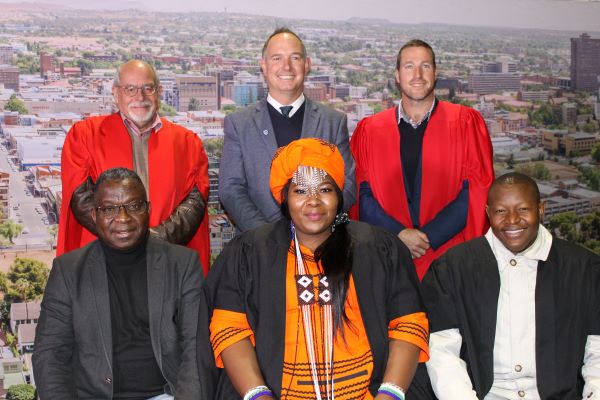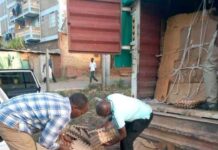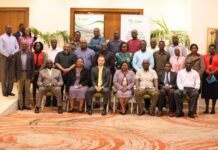
A partnership between the University of the Free State (UFS) and one of South Africa’s biggest banks has birthed the Agribusiness Transformation Programme, which has seen one hundred and eleven farmers in the Free State receive training to date, along with 18 farmers from the Northern Cape. A further 30 farmers in the Free State and 16 in the Northern Cape have enrolled in the programme, demonstrating its continued growth and success.
The initiative aims to empower farmers with skills to help contribute to agricultural output.
Recently, the fourth cohort of farmers received their certificates for completion of the programme at a ceremony held at the UFS Paradys Experimental farm.
Learning about a range of farming principles
In 2018, the university, Standard Bank, and the Free State Department of Agriculture and Rural Development joined forces to establish this programme with a vision to develop black commercial farmers and foster a black-owned sustainable agricultural sector in the country.
The programme featured specialist instructors who taught the farmers a range of farming principles, focusing among others on animal health, animal management, pasture management, feeding, crop production, water and soil management, and farm management including business training, entrepreneurship, and mentorship training. Companies such as GWK and Sernick also provided the farmers with access to their applications.
The Entrepreneurial Value Chain programme in which the farmers received training, was managed by Prof JW Swanepoel from the UFS Department of Sustainable Food Systems and Development, and was developed and coordinated by Dr Johan van Zyl, Senior Researcher at the Central University of Technology (initially affiliated with the Centre for Development Support at the UFS and currently associated with the Central University of Technology) in conjunction with Standard Bank.
Need for transformation in the sector
“In 2018 at Nampo, we recognised the need for transformation within the agricultural sector,” said Brendan Jacobs, Standard Bank’s Head of Business in the Free State and Northern Cape.
According to Jacobs, the primary objective of the programme is to develop smaller black commercial farmers by providing them with access to knowledge, markets, and finance, positioning them to engage effectively with the financial, capital, and market mechanisms essential for establishing successful commercial farming operations. He believes that success in this field is not possible without access to funding, markets, skills, and information.
Jacobs said the programme, with the aim of developing a sustainable agricultural force that is representative of the country, has recorded more than 90% improvement in the farmers’ operations. “This means that more than 93,6% of the farmers grew their farm activities or added new activities to their farms. In a few cases, some farmers added agri-processing activities like making juice from spinach, bottled water from boreholes on the farm, or canned vegetates like beetroot and beans,” said a statement shared by Standard Bank.
Prof Danie Vermeulen, the Dean of the Faculty of Natural and Agricultural Sciences at the UFS, also believes that modern agriculture demands farmers to have a comprehensive understanding of production management, while effectively navigating the intricacies of finance, investment, technology, and market systems. He is of the opinion that in this dynamic landscape, commercial ability is just as important as agricultural expertise, technology, and efficient methods.
Dr Nhlonipho Nhlabatsi, Chief Director of the Department of Agricultural Development and Sustainable Livelihoods (ADSL), expressed his appreciation for the programme. “I am grateful for the partnership between the government, the bank, and the UFS,” he said, emphasising his aspiration for a modernised agricultural sector and encouraging a renewed passion for agriculture.
Dr Nhlabatsi also expressed his satisfaction with the programme’s inclusion of female farmers, who comprise one third of the entire group.
Perspectives of students
One of the students, Lehlohonolo Kenneth, thanked his mentors and said that he learned what farming is all about. “Farming is not as simple as it looks.” If you want to farm, you need a proper foundation. He said this programme aims to provide exactly that.
Another student, Sipho November, also provided his perspective on the programme. “Today is a day of gratitude, earmarking an interesting and fulfilling journey,” he said. November said he had learned about the multi-faceted essence of agriculture and that it is important to work with nature and not against it.
Daleen van Straten Terblanche, another participant in the course, shared her aspiration to – with the knowledge and skills she obtained – help build a South Africa with improved food security.
As the event concluded, Prof Swanepoel congratulated all the farmers. “Well done! I am proud of each and every one of you,” he said, encouraging the farmers to remain proactive and prepared for any unexpected challenges.








